The Pros and Cons of Different Drainage Pipes for Your Home
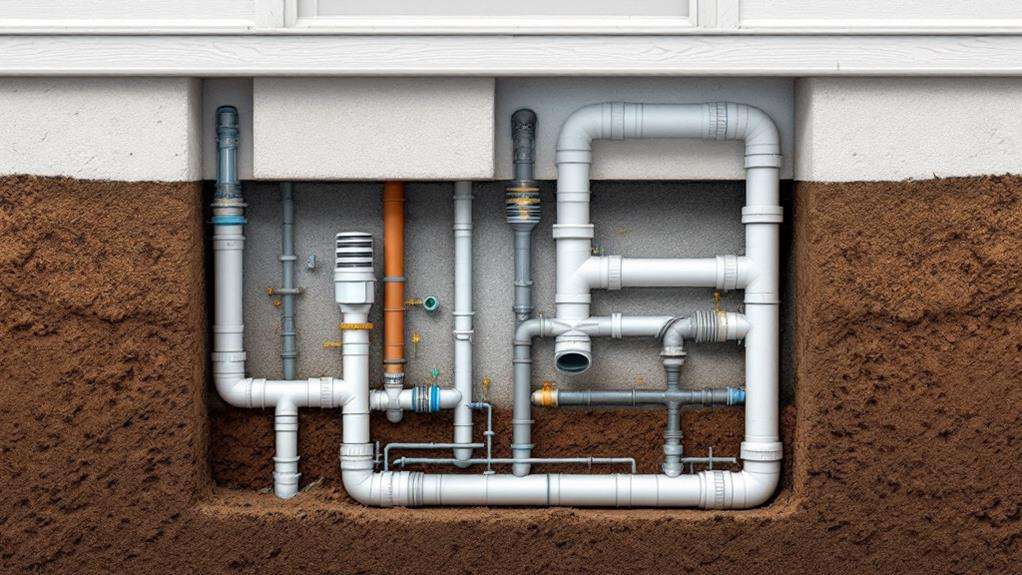
When choosing drainage pipes for your home, you'll encounter various options, each with distinct advantages and drawbacks. Clay pipes offer longevity but can crack, while concrete solutions provide strength but are heavy to install. PVC systems are cost-effective and easy to work with, yet may not be as durable as other materials. HDPE pipes boast exceptional durability but require specialized equipment for installation. Cast iron and copper pipes offer excellent durability and sound-dampening qualities but can be prone to corrosion. Galvanized steel, ABS plastic, and corrugated pipes each have their own unique benefits and limitations. Understanding these differences will help you make an informed decision for your home's drainage needs.
Clay Pipes
Dating back thousands of years, clay pipes remain a popular choice for home drainage systems. They're known for their natural composition and ability to withstand high temperatures. Clay pipes are resistant to most chemicals and acids, making them ideal for areas with corrosive soil conditions.
One of the main advantages of clay pipes is their long lifespan, often lasting over 100 years when properly installed and maintained. They're also environmentally friendly, as clay is a natural material that doesn't leach harmful chemicals into the soil.
However, clay pipes do come with some durability concerns. They can be brittle and susceptible to cracking, especially in areas with frequent ground movement or freezing temperatures. This vulnerability can lead to root intrusion and potential pipe collapse.
Maintenance requirements for clay pipes are relatively low, but when issues do arise, repairs can be costly and disruptive. Regular inspections are indispensable to catch any developing problems early. You'll need to be cautious about tree roots near the pipes and avoid using chemical drain cleaners that could damage the pipe's interior.
Concrete Drainage Solutions
For homeowners seeking durability and strength, concrete drainage solutions offer a sturdy alternative to clay pipes. These heavy-duty options can withstand significant pressure and are ideal for areas with high traffic or deep underground installations. Concrete pipes are less likely to crack or collapse under pressure, making them a reliable choice for long-term drainage needs.
When considering durability, concrete pipes excel in resisting chemical corrosion and withstanding extreme temperatures. They're also less prone to root intrusion, which can be a significant advantage in areas with extensive landscaping. However, it is crucial to note that concrete pipes are susceptible to sulfuric acid damage, which can occur in sewage systems.
Maintenance requirements for concrete drainage solutions are generally minimal. They don't require frequent cleaning or inspection, saving you time and money in the long run. However, if damage does occur, repairing concrete pipes can be more challenging and expensive than other materials.
You'll find that concrete pipes are heavier and more difficult to install than alternatives like PVC or clay. This can lead to higher initial installation costs, but their longevity often offsets this expense over time.
PVC Piping Systems
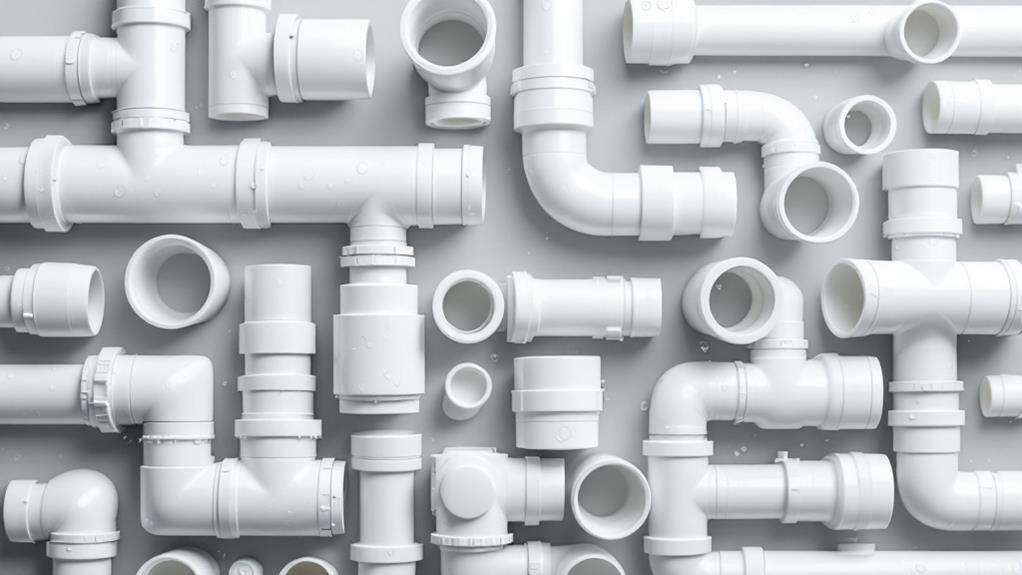
Many homeowners opt for PVC piping systems due to their versatility and cost-effectiveness. These lightweight, durable pipes offer excellent corrosion resistance, making them ideal for various drainage applications. You'll find that PVC pipes are easy to install, even if you're tackling a DIY project. They come in a wide range of sizes and fittings, allowing you to customize your drainage system to suit your specific needs.
When considering PVC piping for your home's drainage, keep these key benefits in mind:
- Smooth interior walls that promote efficient water flow
- Flexibility to withstand ground movement and settle
- Long lifespan with minimal maintenance requirements
- Resistance to chemical degradation from soil and water
PVC pipes are particularly well-suited for residential applications, including roof drainage, foundation drainage, and septic systems. You'll appreciate their installation ease, as they can be cut and joined using simple tools and adhesives. While PVC isn't suitable for all situations, such as high-temperature environments, it's an excellent choice for most home drainage needs. By choosing PVC piping systems, you're investing in a reliable, long-lasting solution that'll keep your property dry and protected for years to come.
HDPE Pipes
High-density polyethylene (HDPE) pipes are gaining popularity as a sturdy alternative for home drainage systems. These pipes offer exceptional long-term durability, resisting corrosion, chemicals, and abrasion. You'll find that HDPE pipes maintain their structural integrity for decades, even in challenging soil conditions.
One of the most significant advantages of HDPE pipes is their easy installation. They're lightweight, flexible, and come in long sections, reducing the number of joints needed. This flexibility allows for smoother installations around obstacles and curved pathways. You can also use trenchless installation methods with HDPE pipes, minimizing disruption to your property.
HDPE pipes are resistant to freezing and thawing cycles, making them ideal for areas with extreme temperature fluctuations. They're also less likely to crack or break under ground movement or settling. However, HDPE pipes can be more expensive upfront compared to other materials like PVC. Additionally, they require specialized fusion equipment for joining sections, which may increase installation costs.
Despite these considerations, HDPE pipes offer excellent value for your home drainage system. Their longevity, resistance to environmental factors, and ease of installation make them a worthy investment for many homeowners seeking a reliable, long-lasting drainage solution.
Cast Iron Drainage
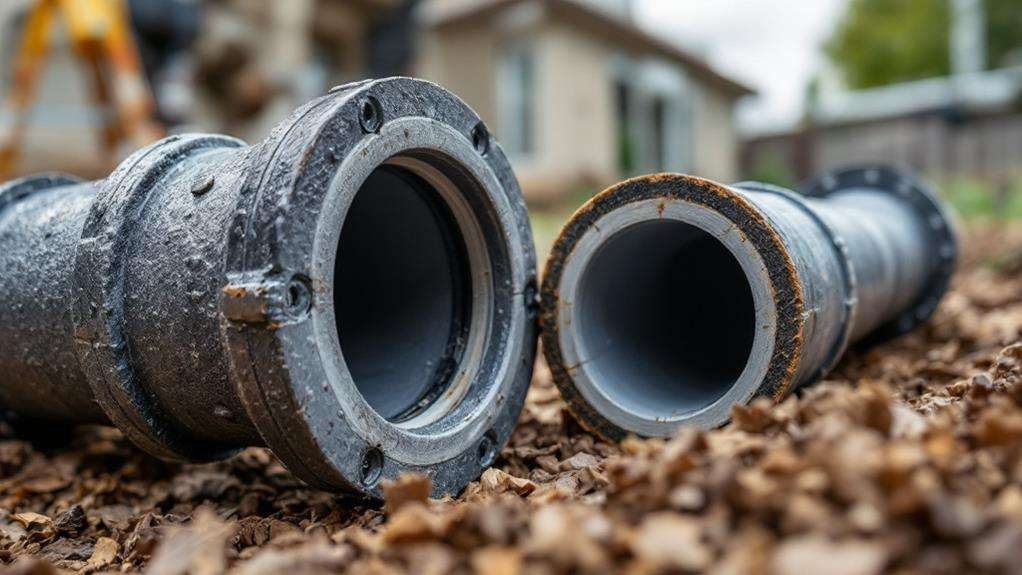
While HDPE pipes offer modern advantages, cast iron drainage systems have long been a staple in home construction. You'll find these pipes in many older homes, appreciated for their durability and sound-dampening qualities. Cast iron's weight and strength make it resistant to damage from ground movement, ensuring your drainage system remains intact for decades.
When considering cast iron drainage, keep longevity considerations in mind. These pipes can last up to 100 years with proper care, outlasting many other materials. However, they're not without drawbacks. Maintenance requirements for cast iron pipes can be more demanding than newer alternatives. You'll need to watch for:
- Rust and corrosion developing on pipe surfaces
- Cracks or breaks due to shifting soil
- Tree root intrusion through joints
- Build-up of scale inside the pipes
Despite these challenges, cast iron drainage systems offer excellent fire resistance and can handle high-temperature waste water. They're also recyclable, making them an environmentally conscious choice. When installing or replacing drainage pipes, weigh the upfront cost against the long-term benefits. Cast iron's durability might justify the higher initial investment, especially if you're planning to stay in your home for many years.
Copper Pipe Options
For those seeking a reliable and long-lasting drainage solution, copper pipes offer an attractive option. These pipes boast exceptional durability advantages, making them a popular choice for homeowners who want a drainage system that will stand the test of time. Copper's natural corrosion resistance helps protect against leaks and deterioration, ensuring your pipes remain functional for decades.
You'll find that copper pipes are relatively easy to install and maintain, thanks to their lightweight nature and flexibility. They're also resistant to bacteria growth, which can help prevent unpleasant odors and potential health hazards. However, it is essential to recognize that copper pipes come with a higher upfront cost compared to other materials.
While copper pipes are generally suitable for most drainage applications, they may not be ideal for areas with highly acidic water, as this can accelerate corrosion. Additionally, copper pipes can be prone to freezing in extremely cold climates, so proper insulation is of the utmost importance if you live in such areas. Despite these considerations, many homeowners find that the longevity and reliability of copper pipes make them a worthwhile investment for their drainage needs.
Galvanized Steel Pipes
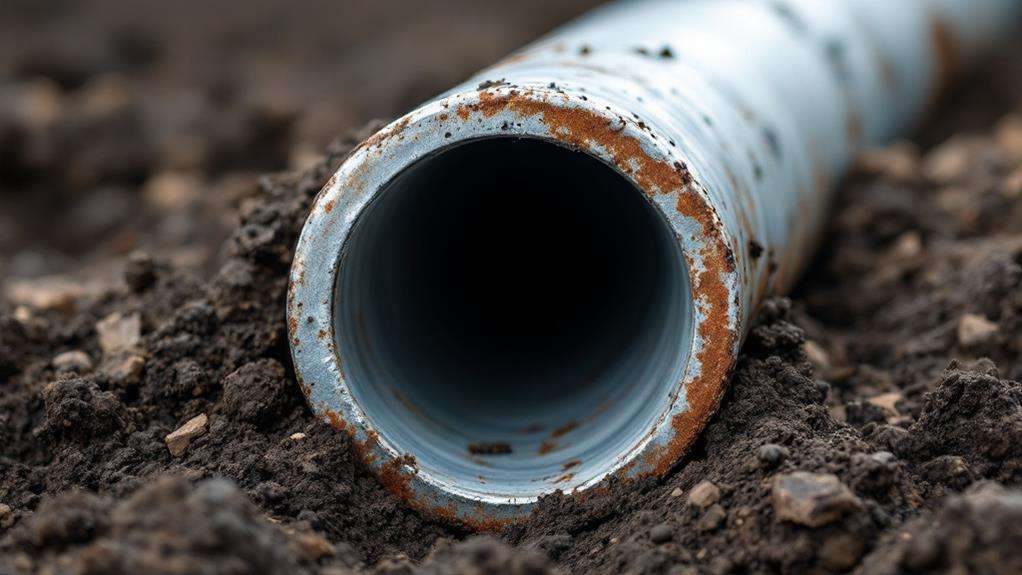
Galvanized steel pipes offer a sturdy and cost-effective drainage solution for many homeowners. These pipes are coated with a layer of zinc, which helps protect them from rust and corrosion. You'll find that galvanized steel pipes are commonly used in older homes and can last for several decades when properly maintained.
However, it's important to be aware of potential corrosion issues that can arise over time. As the zinc coating wears away, the underlying steel becomes exposed to water and air, leading to rust formation. This can result in long-term durability concerns, especially in areas with high water pressure or acidic soil conditions.
When considering galvanized steel pipes for your drainage system, keep these visual characteristics in mind:
- Silver-gray color with a slightly textured surface
- Visible threading on pipe ends for easy connections
- Occasional small bumps or irregularities in the zinc coating
- Gradual darkening or discoloration as the pipes age
Despite their initial strength, galvanized steel pipes may require more frequent inspections and potential replacements compared to other materials. You'll need to weigh the upfront cost savings against the possibility of future maintenance expenses when deciding if galvanized steel pipes are the right choice for your home's drainage needs.
ABS Plastic Piping
ABS plastic piping's popularity has expanded substantially in recent years due to its numerous advantages. You'll find that this type of drainage pipe offers a powerful combination of strength and affordability. ABS, or Acrylonitrile Butadiene Styrene, is a thermoplastic polymer that's resistant to impacts, chemicals, and temperature fluctuations.
One of the key benefits you'll appreciate is the increased durability of ABS pipes. They're less likely to crack or break under pressure, making them ideal for underground installations. You'll also enjoy lower maintenance requirements compared to metal alternatives. ABS pipes don't rust or corrode, which means you won't need to worry about replacing them as frequently.
Installation is another area where ABS excels. The pipes are lightweight and easy to handle, which can dramatically reduce labor costs. You'll find that joining ABS pipes is straightforward, typically done with solvent cement. This creates a strong, watertight seal that's resistant to leaks.
However, it's crucial to understand that ABS isn't suitable for all applications. Some building codes restrict its use, particularly in commercial settings. You'll also need to protect ABS pipes from prolonged UV exposure if used above ground, as sunlight can degrade the material over time.
Corrugated Drainage Pipes
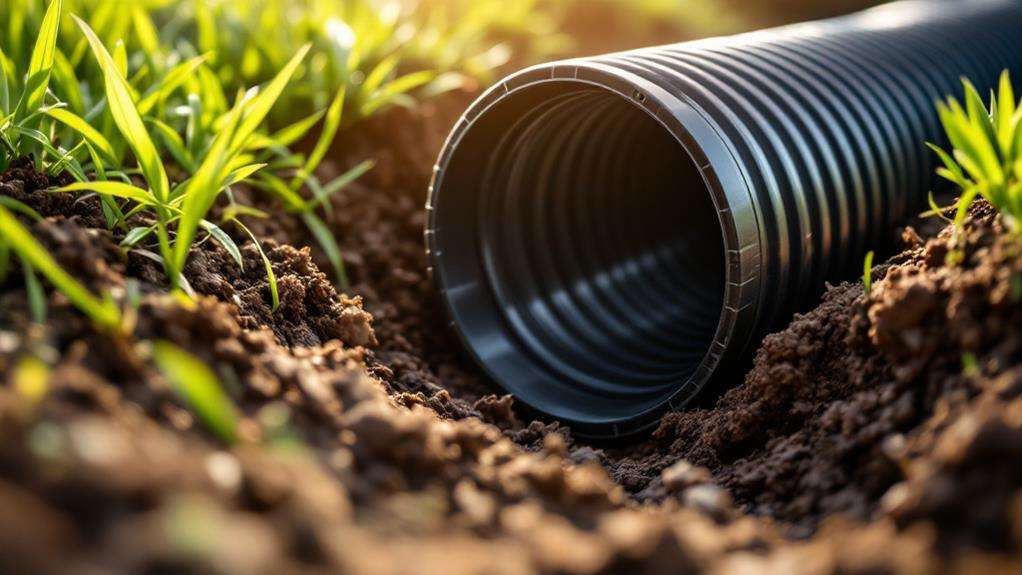
When it comes to efficient water drainage around your property, corrugated pipes are a top choice. These flexible pipes are made from polyethylene or polypropylene and feature a ribbed design that enhances their strength and durability. You'll find them commonly used in landscaping, foundation drainage, and agricultural applications.
Corrugated pipes offer several advantages:
- They're lightweight and easy to transport
- Their flexibility allows for installation around obstacles
- They come in long sections, reducing the need for joints
- Their ribbed structure provides excellent crush resistance
Installation ease is a significant benefit of corrugated pipes. You can easily cut them to size with a handsaw and connect sections using simple fittings. However, flexibility concerns may arise in certain situations. While their bendable nature is generally an advantage, it can lead to sagging if not properly supported, potentially causing water to pool in low spots.
Despite this drawback, corrugated pipes remain a popular choice for many homeowners due to their cost-effectiveness and versatility. When planning your drainage system, consider the specific requirements of your property and consult with a professional to determine if corrugated pipes are the right solution for your needs.
